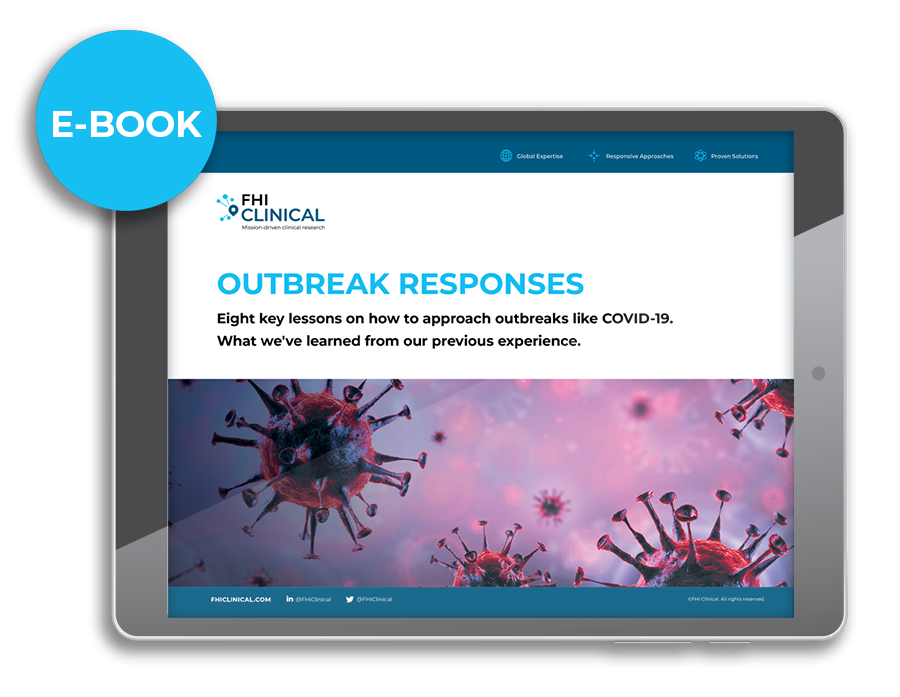What can we learn from past outbreaks?
Outbreaks large and small require rapid, coordinated responses. In this e-book, we describe eight considerations for outbreak responses, based on the collective experience of our experts.

What we cover in this e-book:
Download e-book
- Eight key areas of focus for outbreaks across public health, research and social sciences
- Specific examples from Ebola, HIV and other infectious disease outbreaks that have informed our approach to COVID-19
- FHI Clinical's contribution to outbreak responses
About the contributors
M. Michelle Berrey, MD, MPH
Dr. Berrey is a public health and infectious diseases physician. Her career in drug development has focused on developing oral antivirals for hepatitis C, HIV, herpesviruses and smallpox. Public-private partnerships have been a cornerstone of Michelle’s career, evidenced by joint trial designs with NIH in HCV in 2009, with WHO and MSF for Ebola in 2014, and with BARDA for the first dual-use medical countermeasure for smallpox.
As president and CEO of Chimerix, she led development of the company’s lead product candidate, brincidofovir, an antiviral investigated for the treatment of smallpox, life-threatening adenovirus and ebolavirus infections.
Dr. Berrey received her MD from the Medical College of Georgia and a Master of Public Health from Emory University. She completed her internship and residency in Internal Medicine at the University of North Carolina at Chapel Hill and was a Senior Fellow in Infectious Diseases at the University of Washington, Seattle, where she conducted research in HIV transmission and acute HIV infection. She is Board Certified in Internal Medicine and Infectious Diseases.
Claudia Christian, Senior Vice President of Clinical Operations at FHI Clinical
With more than 25 years of experience, Claudia Christian has held positions in pharmaceutical, biotech and CROs across multiple indications. Since 2014, she has devoted her expertise full-time to infectious disease research, including managing multiple study protocols and developing sites across West Africa during the Ebola outbreak response. Since that time, she has managed millions of dollars in federally and privately funded grants as well as commercially funded vaccine and other therapeutic studies.
As Senior Vice President, Clinical Operations, Claudia leads the overall direction and strategic implementation of program execution for all clinical research activities at FHI Clinical.
Claudia holds a bachelor’s degree in Biology from Trinity College-Hartford and a master’s certification in Education from Saint Joseph College.
Peggy Coyle, Director at FHI Clinical
Peggy Coyle is a skilled clinical research project manager with experience managing complex clinical trials, building site capacity and developing rapid response for trials across multiple therapeutic areas, including infectious diseases, oncology and emerging diseases. She also has extensive experience in clinical research and vaccines that includes Institutional Review Board (IRB) development.
Peggy managed the company’s Vietnam clinical research team during the H5N1 outbreak and led a program to build out trial capacity for sites in that region over a six-year period. During the Ebola outbreak in Sierra Leone, Peggy worked in-country to implement rapid start-up of a vaccine trial. Additionally, she trained leaders from the National Public Health Institute of Liberia and the Liberian Institute of Biomedical Research, University of Liberia students and faculty, Liberian Ministry of Health officials and PREVAIL staff members in clinical research fundamentals in Monrovia, Liberia. Through her time on the ground during these outbreaks, she learned the value of establishing good relationships with local government and other leaders, which was vital to creating high-quality and sustainable programs.
Peggy holds a bachelor’s degree in Nursing and a master’s degree of Education and Science in Public Health from the University of Toledo.

